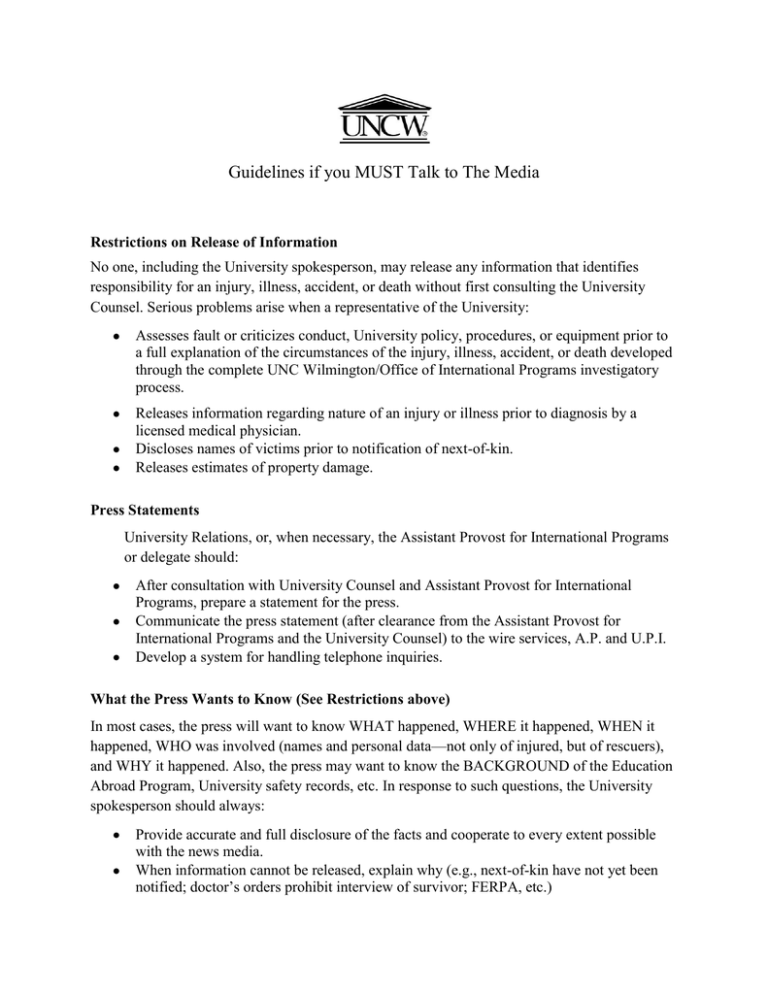Guidelines if you MUST Talk to The Media
advertisement

Guidelines if you MUST Talk to The Media Restrictions on Release of Information No one, including the University spokesperson, may release any information that identifies responsibility for an injury, illness, accident, or death without first consulting the University Counsel. Serious problems arise when a representative of the University: Assesses fault or criticizes conduct, University policy, procedures, or equipment prior to a full explanation of the circumstances of the injury, illness, accident, or death developed through the complete UNC Wilmington/Office of International Programs investigatory process. Releases information regarding nature of an injury or illness prior to diagnosis by a licensed medical physician. Discloses names of victims prior to notification of next-of-kin. Releases estimates of property damage. Press Statements University Relations, or, when necessary, the Assistant Provost for International Programs or delegate should: After consultation with University Counsel and Assistant Provost for International Programs, prepare a statement for the press. Communicate the press statement (after clearance from the Assistant Provost for International Programs and the University Counsel) to the wire services, A.P. and U.P.I. Develop a system for handling telephone inquiries. What the Press Wants to Know (See Restrictions above) In most cases, the press will want to know WHAT happened, WHERE it happened, WHEN it happened, WHO was involved (names and personal data—not only of injured, but of rescuers), and WHY it happened. Also, the press may want to know the BACKGROUND of the Education Abroad Program, University safety records, etc. In response to such questions, the University spokesperson should always: Provide accurate and full disclosure of the facts and cooperate to every extent possible with the news media. When information cannot be released, explain why (e.g., next-of-kin have not yet been notified; doctor’s orders prohibit interview of survivor; FERPA, etc.) IMPORTANT NOTE: Withholding the NAMES of victims pending notification of nextof-kin is appropriate and will be respected by the press. However, we should not deny that the accident or incident itself occurred. Refrain from speculation; when the answer to a query is not known, so state. Provide the media with background material on Education Abroad’s safety record if appropriate. Make certain all media and all reporters have equal access to information. Upon discovering that erroneous information has been given to the media, provide correct information as soon as possible. When a reporter prints or broadcasts erroneous information, inform the reporter (not her/his supervisor), and provide the correct information. When given conflicting information by different sources, determine which version is accurate before releasing it. Keep the appropriate offices (e.g., University Counsel, Provost and Vice Chancellor for Academic Affairs) informed of any developments that might involve liability or reflect adversely on the University. General Guidelines for Responding to Media Requests for Information The following comments are offered as general guidance in dealing with the news media: You will find the media cooperative if you deal with them straightforwardly and with facts, subject only to legal constraints, consideration for next-of-kin, protection of the injured, and good taste. Hesitantly or improperly dealing with the press in an emergency situation may not only escalate their news coverage, but in the long run can be critically costly to the University and take a great deal longer to remedy. From a public relations point of view, the objective is to have a one-day story and to avoid a continuing series of headlines and features dragged out over a period of days or weeks. To this end, we should provide the news media with as much detail as possible as early as possible. Most dealings with the news media will take place over the telephone. Rather than reading a “canned story” to the caller, the spokesperson should have a written list of key points for reference, and tell the story in her/his own words. The image projected by the spokesperson of concern and caring may have an important effect on the eventual tone of the story that appears. It is important to impress on the media any kind of humanitarian, thoughtful acts taken by the University (Director visits family, etc.).